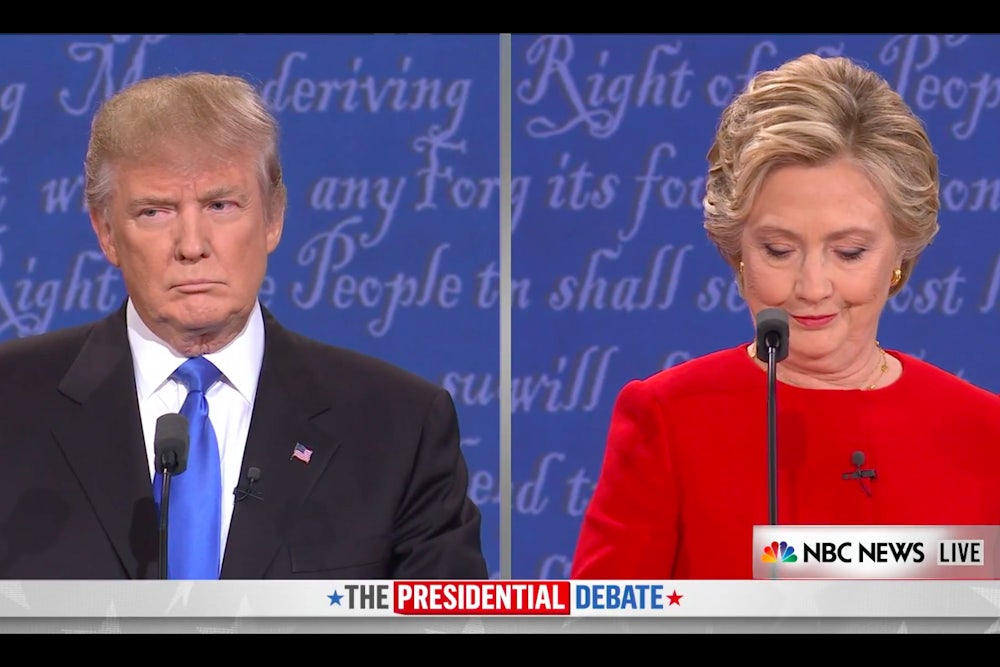In her acceptance speech at the Democratic convention, Hillary Clinton called out Donald Trump memorably, saying, “A man you can bait with a tweet is not a man we can trust with nuclear weapons.” The insight that Trump is easy to provoke formed the core of Clinton’s successful strategy in the first debate on Monday, as she repeatedly incited the Republican nominee to both adopt an off-putting aggressive tone and to make a series of damaging self-admissions.
During the Republican debates, Trump got away with outrageous behavior because he seemed like a clown who was having fun. That jovial spirit disappeared tonight, thanks to Clinton’s ability to needle Trump. Instead of being a joker above the fray, he came across as petulant and peevish, often yelling incoherent answers. Even Trump supporter Ari Fleischer tweeted, early on, that “Trump is getting too loud and too hot. If I were him, I’d tone that down a notch.”
Trump’s is a narcissistic defensiveness, as my colleague Laura Reston noted during the debate. If you criticize him, he has to keep counterpunching, even if it makes him look bad. A classic moment occurred early, establishing the pattern. Trump was doing an effective job of hammering Clinton on her emails—then suddenly stopped his attack to go back and answer an earlier critique she made of his business practices. At one point, Trump even started making a sales pitch for a hotel he’s building in Washington, D.C., noting, “If I don’t get there one way, I’m going to get to Pennsylvania Avenue another.”
Trump’s driving need to speak up for himself led to self-sabotaging admissions. When Clinton accused Trump of eagerly benefitting from the housing crisis, he responded, “That’s called business, by the way.” When Clinton complained that Trump paid no taxes, he again took pride in the accusation, saying, “I take advantage of the laws of our nation.” Trump also said that it was good he paid little or no taxes because the money would’ve been wasted, “it would have been squandered too.”
The more he talked on taxes, the less coherent Trump became. He said he’d be happy to reveal his taxes quickly as soon as he is no longer audited—but also said he had been audited for 15 years (which suggests the date of the reveal, should there be one, will be far in the future).
When she went into detail about how he didn’t pay many small-business owners whose services he’d contracted with, he didn’t deny the charge, but waved it off—they hadn’t done a good job, he claimed, and other people were happy to do business with him.
In all these moments, Clinton got Trump to go against his own self-presentation as the populist friend of the little man and reveal himself to be a selfish, avaricious businessman.
The pattern was repeated on racial issues—and not just when Trump grimaced at the very idea of there being buoyant black communities. Earlier, Clinton correctly brought up the fact that Trump had “a long record of engaging in racist behavior,” refusing to rent to blacks, for which he had been charged by the government. Trump’s response was that there had been no admission of guilt and that the practices were widespread in the industry. To anyone paying attention, these answers amounted to an admission of the basic facts of the case.
By the latter stages of the debate, Trump had been reduced to virtual incoherence, sputtering a defense of his claim to have opposed the Iraq War by repeatedly invoking Sean Hannity as a witness. The problem with such a claim is, of course, that Hannity’s word carries little weight outside the hard-right Fox News audience which is already pro-Trump.
Will Trump lose any support with those folks because of his poor performance on Monday night? It’s highly unlikely, since his fans have stood by him for worse and ... for worse. But since Trump has been behind in the polls by an average of 1 to 4 percent or more for months now, he needed to do more in this first encounter than shore up his base. He needed to start convincing some skeptics that he could be a credible president. And he failed, because Hillary Clinton got so effectively under his skin.
